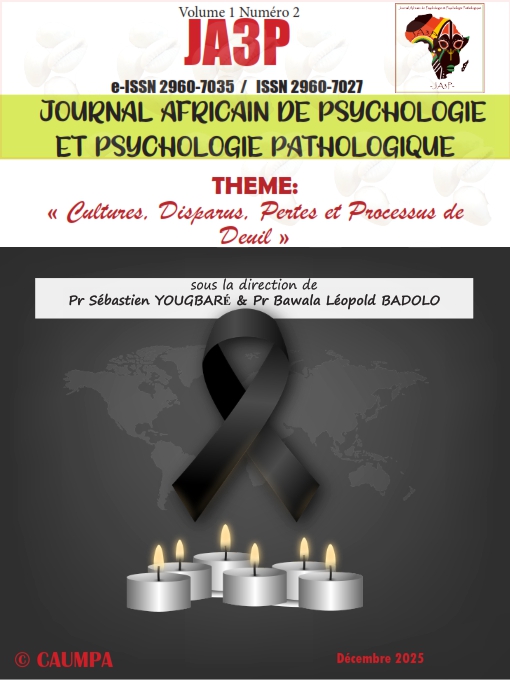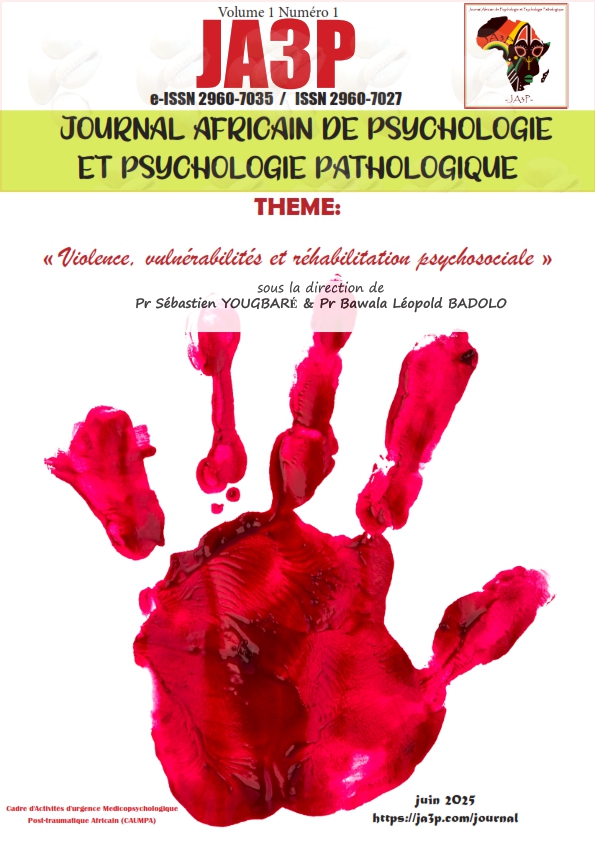Archives
-

LES THÉORIES DE L’APPRENTISSAGE ET LEUR IMPACT SUR L’APPRENTISSAGE
Vol. 1 No. spécial 1 (2025)Terrorist attacks in Sahel countries, under the perplexed gaze of the regional and international community, bring to mind Edmond Marc (2005) in his book Psychologie de l’identité : soi et groupe. He observes that identity issues trouble our era. Transdisciplinary discourses on identity describe a "postmodern" individual, characterized by an incessant quest for self; an ambivalent quest where identity affirmation becomes both an exhilarating goal and an overwhelming burden. The individual is not alone in this pursuit; social groups are also engaged in an anxious search for or defense of their identity, whether ethnic or regional communities. All these manifestations are interconnected and undeniably reflect a crisis shaking the foundations of sociality at all levels—from individuals to institutions and global societies.
And he continues in these terms: *"Identity, when it does not feel threatened, is not questioned; it imposes itself with tranquil self-evidence. It is in moments of doubt, denial, rupture, and upheaval that it becomes problematic. The uncertainty and fragility affecting it are symptoms of a ‘civilizational malaise’ that undermines traditional models, values, reference points, and the institutions that uphold them. The couple, the family, the school, the workplace, and the justice system show deep fissures, leaving the individual anxious and vulnerable. Statuses, roles, and identification models become blurred, making everyone's place uncertain and ever-changing. Precarity affects not only professions and employment but also emotional and family bonds, leaving individuals with a sense of confusion and instability. The ‘struggle for position’ (Gaulé-Jack & Taboada-Leonetti, 1993) replaces the class struggle, as if each person must continuously fight to defend their personal and social existence and have it recognized by others. Competition for possession and appearance becomes the driving force of relational, economic, and social life—from educational paths to professional success—even extending into romantic and sexual spheres (Fromm, 1976). Thus, identity issues appear at the heart of the psychosocial and cultural transformations shaping today's world. As psychoanalyst Erik Erikson insightfully predicted in 1968: ‘The study of identity is becoming as central in our time as the study of sexuality was in Freud’s time’” (Edmond Marc, 2005, p.19).
This conviction of Edmond Marc (2005) echoes the studies of numerous authors in psychology and psychiatry who have established links between trauma, affective bonds, and group dynamics. John Bowlby (1969, 1973, 1980), renowned for his attachment theory, posited that early relationships with attachment figures (usually parents) are crucial for later emotional and social development. Traumas within these relationships can have long-lasting effects on an individual’s relational and emotional capacities. Mary Ainsworth (1978) expanded on Bowlby’s work with her famous “Strange Situation” studies, identifying different attachment styles: secure, avoidant, and anxious/ambivalent. These styles influence how individuals respond to trauma and group dynamics. Sigmund Freud (1920s–1930s) introduced the concepts of transference and countertransference in therapeutic relationships, which can also be applied to group dynamics and affective relationships. His work demonstrates that traumatic experiences can be repeated and expressed within these dynamics.
Judith Herman (1992), in her book Trauma and Recovery, explores the effects of trauma on interpersonal relationships and emphasizes the importance of safety, shared memory, and the reconstruction of affective bonds in trauma healing. Wilfred Bion (1961) studied group dynamics and introduced concepts such as “attacks on linking” and “group assumptions,” shedding light on how trauma can affect group functioning and relationships within groups. Pierre Janet (1889) was one of the first to explore psychological trauma and its effects on individuals. He noted that trauma could fragment consciousness and disrupt interpersonal relationships, causing dissociations and breaks in affective bonds.
The above-mentioned authors have each provided unique perspectives on how trauma, affective relationships, and group dynamics are interconnected, profoundly affecting psychological well-being and social interactions. In this conference, we aim to expand on these ideas in light of the current terrorist crisis in the Sahel, addressing the question of self and group identity. This crisis imposes a phenomenon of internally displaced persons, reflecting not only physical displacement but also a psychological dislocation, necessitating an identity restructuring.
-

Cultures, Disparus, Pertes et Processus de deuil
Vol. 1 No. 2 (2025)Le Journal Africain de Psychologie et de Psychologie Pathologique est une revue de recherche scientifique attachée au Cadre d’Activités d’Urgence Médicopsychologique Posttraumatique Africain (CAUMPA). Ce cadre créé en décembre 2024, a pour but d’améliorer la résilience des populations africaines face aux traumatismes psychologiques liés aux situations de crise, en renforçant les capacités de réponse d’urgence et le suivi à long terme à travers la recherche et l’intervention. Entre autres objectifs spécifiques, le CAUMPA suscite des réflexions sur les questions de traumatisme et encourage les implications de prise en charge psychologique en situation de crise en vue de proposer des solutions adaptées au contexte africain. Dans ce sens, le Journal Africain de Psychologie et de Psychologie Pathologique lance le présent appel à publication.





